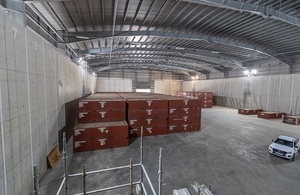2022 is a critical year for biodiversity and our planet: UK statement to the OSCE
The protection, restoration and sustainable management of natural resources are essential to mitigate the impacts of the climate and biodiversity crises, which pose a threat to international peace and stability. This is no truer than in the case of water, which is increasingly a threat multiplier.
In 2013, there were 27 events in which water was a trigger for conflict. Four years later, this had risen to 71.
This upward trend is caused by the growing global water crisis. With only 3 percent of the earth’s water freshwater – and most of this inaccessible, degraded or unevenly distributed – scarcity is compounded by population growth, food and energy demands, and climate change. Estimates suggest that four billion people now live in areas with severe water scarcity; and that by 2030 there could be around 700 million people displaced because of water scarcity, affecting national and regional security.
We see these trends play out in our region regularly, particularly in Central Asia where tensions over scarce water resources, and unilateral water infrastructure developments, have aggravated existing disputes and contributed to new conflicts.
Accessing water continues to be a grave issue for those living in conflict zones. Russia’s deliberate targeting of civilian infrastructure has led to extensive power and water shortages, causing further suffering for the Ukrainian people. Just two weeks ago, parts of the Ukrainian city of Kryvyi Rih were flooded after Russia attacked a nearby dam.
The OECD has said that as a result of damage to water supply infrastructure in Ukraine, an estimated 1.4 million people currently have no access to safe water, and a further 4.6 million people have only limited access. To help relive Ukraine from these effects of Russia’s brutal aggression, the UK has donated 856 generators to Ukraine to power essential services, including water pumping stations.
However, there is potential for water to play a role in reducing conflict. Water historically has more often led to cooperation than conflict between countries. For example, in the period 1948-2000, co-operative events over international waters outweighed conflictual ones by two to one.
Cooperation over water can also benefit other areas, such as peace, security and prosperity through positive impacts on food security, economic stability, improved regional integration, and better trade relations.
Promoting this cooperation, states need to apply diplomatic tools such as negotiations, fact-finding missions, and the establishment of consultation platforms for existing or emerging disagreements. This is where the OSCE is well placed to play a role. We celebrate the work the OCEEA does to enhance co-operation over transboundary water resource management, and to integrate women’s voices.
Mr Chair,
2022 is a critical year for biodiversity and our planet. The UK is committed to working with the OSCE and other international partners to secure an ambitious post-2020 Global Biodiversity Framework to halt and reverse biodiversity loss by 2030. We will continue to champion protection of at least 30% of land and ocean globally.
In collaboration with others, the UK has developed a 10 Point Plan for Financing Biodiversity, launched at UNGA last month. The plan defines a clear pathway for bridging the global nature finance gap, and I invite all colleagues here to endorse the 10 point plan ahead of the biodiversity COP later this year. Further, I hope states will join the UK in taking steps to ensure all Overseas Development Assistance becomes ‘nature positive’; and supporting the full and effective implementation of the Multilateral Development Banks’ COP26 Joint Statement on Nature, People and Planet.


